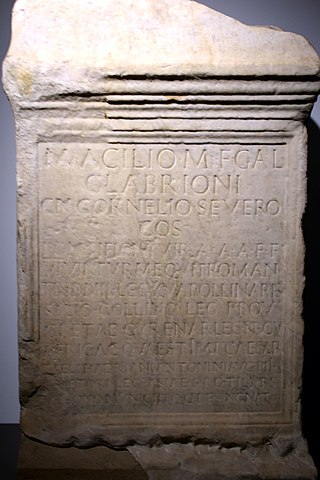Related Research Articles
The gens Acilia was a plebeian family at ancient Rome, that flourished from the middle of the third century BC until at least the fifth century AD, a period of seven hundred years. The first of the gens to achieve prominence was Gaius Acilius, who was quaestor in 203 and tribune of the plebs in 197 BC.
Aulus Didius Gallus Fabricius Veiento was a Roman senator who played a major role in the courts of several Roman emperors during the first century AD. For his usefulness, Veiento was rewarded with the office of suffect consul three times in a period when three consulates were very rare for non-members of the Imperial family.
Manius Acilius Glabrio was a Roman Senator who served as consul ordinarius in AD 91 as the colleague of Trajan, afterwards emperor. Although one of many senators executed during the reign of Domitian on the alleged grounds of plotting against the emperor, he was remembered by his contemporaries best for his strength. Domitian summoned Glabrio during the latter's consulate to his Alban estate during the festival of the Juvenalia to kill a large lion; not only did Glabrio despatch the beast, but he escaped all injury. Following his defeat of the lion, Glabrio was banished by Domitian, then executed while in exile.
Manius Laberius Maximus was a Roman senator and general, who was active during the reign of Domitian and Trajan. He was twice consul: the first time he was suffect consul in the nundinium of September to December 89 AD as the colleague of Aulus Vicirius Proculus; the second time as ordinary consul in 103 as colleague to the Emperor Trajan.
Marcus Asinius Marcellus was the name of two men of the Asinii.
Lucius Aelius Lamia Plautius Aelianus was a Roman senator.
Pompeius Silvanus, fully Marcus Pompeius Silvanus Staberius Flavinus or Flavianus, was a Roman senator who was consul twice.
Manius Acilius Aviola was a Roman senator who served as Consul ordinarius in 239 as the colleague of Emperor Gordian III. He is considered a son of the Manius Acilius Aviola who is mentioned as being present as a child at the meetings of the Arval Brethren for the years 183 and 186; as well as the descendant of the homonymous consul of AD 122.
Gaius Oppius Sabinus was a Roman Senator who held at least one office in the emperor's service. He was ordinary consul in the year 84 as the colleague of emperor Domitian.
Lucius Tettius Julianus was a Roman general who held a number of imperial appointments during the Flavian dynasty. He was suffect consul for the nundinium of May–June 83 with Terentius Strabo Erucius Homullus as his colleague.

Manius Acilius Glabrio Gnaeus Cornelius Severus was a senator of the Roman Empire. He was consul ordinarius in 152 with Marcus Valerius Homullus as his colleague. Acilius Glabrio is known almost solely from surviving inscriptions.
Acilius Severus was a member of the Roman aristocracy of the fourth century AD. He is known to have been consul with Vettius Rufinus as his colleague, and to have served as urban prefect of Rome.

Lucius Funisulanus Vettonianus was a Roman general and senator during the reigns of the Flavian emperors. He was suffect consul in the nundinium of September to October 78 with Quintus Corellius Rufus as his colleague.
Gaius Calpurnius Acilius Aviola was a senator of the Roman Empire. He was suffect consul in AD 24 with Publius Cornelius Lentulus Scipio as his colleague. Aviola is also recorded as being governor of Asia in 37/38. Aviola has been identified as the father of Manius Acilius Aviola, consul in 54.
Lucius Valerius Catullus Messalinus was a Roman senator during the Flavian dynasty, and is best known as the most hated and ruthless delator or informer of his age. He was feared all the more due to his blindness.
Lucius Julius Ursus was a relative of the Flavian dynasty, who was originally one of the equites who held several imperial appointments, but afterwards was promoted to the Roman senate. He was suffect consul three times: once under Domitian and twice under Trajan.
(Lucius?) Plotius Pegasus was a Roman senator and jurisconsult active under the Flavian dynasty. He was suffect consul in an uncertain year, most likely 72 or 73, as the colleague of Lucius Cornelius Pusio Annius Messalla. Shortly after his ascension to the imperial throne, Domitian appointed Pegasus urban prefect, one of the most prestigious offices in a senatorial career.
Publius Sallustius Blaesus was a Roman senator active during the last half of the first century AD. He was suffect consul for the nundinium May to August 89 with Marcus Peducaeus Saenianus as his colleague. Despite his social rank, Blaesus is a shadowy figure about whom scholars have made numerous sumises.
Lucius Corellius Neratius Pansa was a Roman senator, who was active during the reign of Hadrian. He was ordinary consul in AD 122 as the colleague of Manius Acilius Aviola. Other than holding the office of consul, Pansa is only known for being the subject of a letter of Pliny the Younger.
Titus Aurelius Fulvus was a Roman consul and grandfather of the emperor Antoninus Pius; as his son by the same name was Pius's father.
References
- 1 2 CIL VI, 1331
- ↑ Brian W. Jones, The Emperor Domitian (London: Routledge, 1993), p. 51
- ↑ Paul Gallivan, "Who Was Acilius?", Historia: Zeitschrift für Alte Geschichte , 27 (1978), p. 622; Ronald Syme, "The Historian Servilius Nonianus", Hermes, 92, 4 (1964), pp. 413-414.
- ↑ Satires, iv.94-96
- ↑ Gallivan, "Who was Acilius?", p. 623